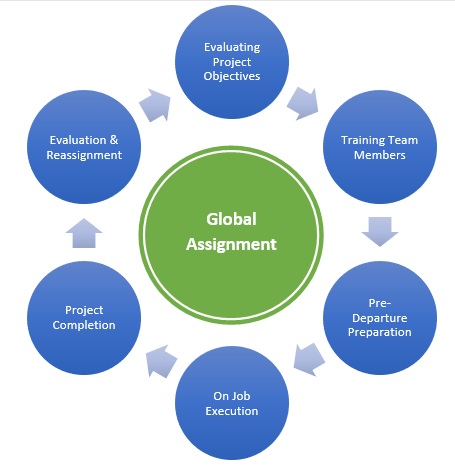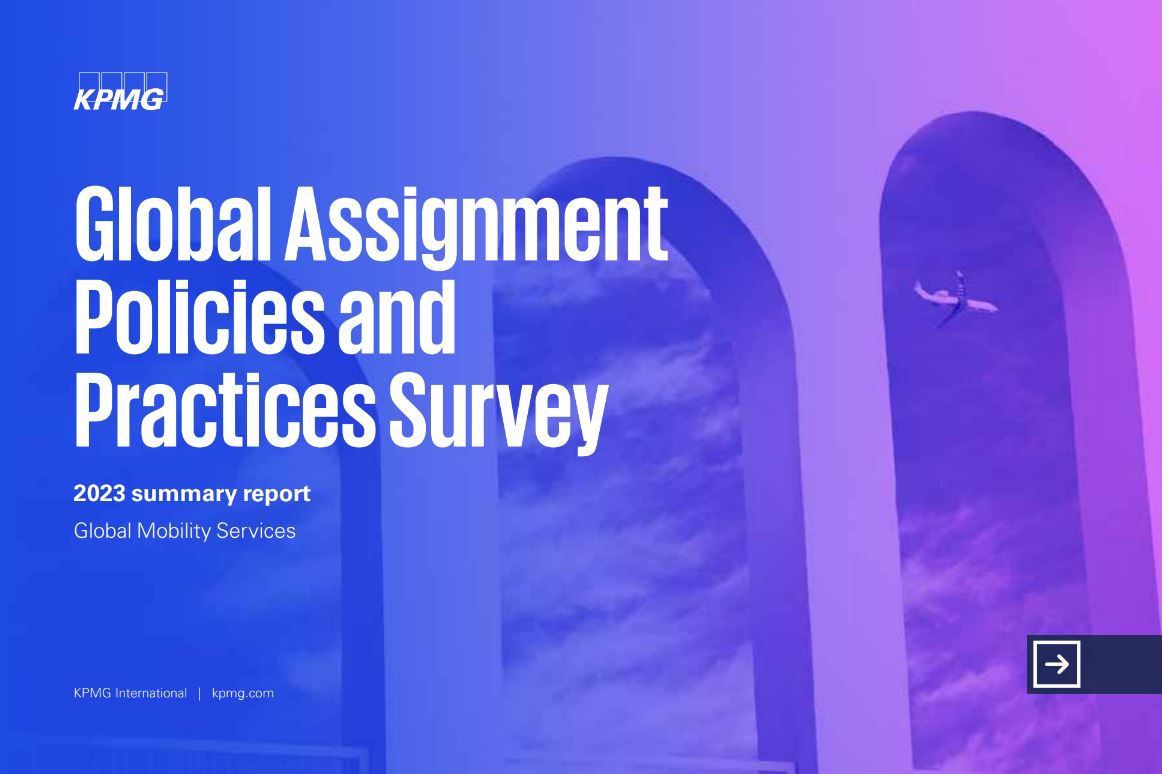- Marketing Mix Strategy
- Five Forces
- Business Lists
- Competitors
- Business Concepts
- Human Resources (HR)

Global Assignment
This article covers meaning, importance, steps & example of Global Assignment from HRM perspective
What is Global Assignment?
Global assignments are business projects which are allotted to some employees outside the home country. Global assignments are employers assigning their employees on projects which are globally implemented. Global assignments are mostly taken place in multinational companies and may involve employees to relocate from their current country to a different country where the assignment is assigned.
Since globalization has taken place rapidly and the world has become more connected, it has become a very common phenomenon. Many countries face skill shortage or require an expert for a particular assignment so they would hire the person with the requisite skills or knowledge from other countries and pay the person a hefty compensation as demanded by the person.
Steps in Managing Global Assignment
Some steps in managing global assignments & international projects are:
1. Evaluating objectives of the international project
2. Identifying team members & giving pre-requisite training
3. Pre-departure preparation of activities & work to be done
4. On job activities on global assignment at international location
5. Project completion
6. Evaluation & reassignment if required

Importance of Global Assignment
Global assignments as identified by experts in international human resource management are of three types
1. Technical assignments: Employees may be assigned global assignments if they have the technical skills that are required by the MNC for a particular assignment and the MNC is not able to find anyone as capable as that person internally and in that particular country, if a person is located within the MNC in another country then that person is sent on a technical assignment.
2. Developmental assignments: Developmental assignments are typically used to develop a project or concept that is new to a different location or develop skills in a different location which is not implemented in that location, it is also used by institutes to bring in faculties from different parts of the globe to give the students an exposure to different perspectives and cultures and their thoughts on the scenario of the subject.
3. Strategic Assignments are global assignments in which a key partner is sent to launch a product in a key location, develop the market or get necessary changes in the business strategy or even sign Memorandum of Understandings and Joint Venture deals.
Advantages of Global Assignments
Some advantages of global assignments are
1. Skills and knowledge which are not available in a country can be brought from other countries.
2. MNC’s are able to get their projects done more effectively and not having the problem of talent not being available.
3. Employees may be motivated to join an MNC which assigns global assignments to its employees regularly.
Example of Global Assignment
Here is an example of global assignment for a hypothetical organization Company A. Company A could not find a person who could communicate in French, German and Hindi in their main headquarters in USA as they felt that there would be a gap in understanding if the language is translated to English, and then to either of these languages. So, since they did not find the any person who had proficiency in these three languages in their headquarters and started finding for a person with the language skills throughout all their office. Company A found a person in their international office in India with the knowledge in these three languages. So, they assigned her the project under a global assignment and she was asked to relocate to the main headquarters located in the United States for the duration of the project.
Hence, this concludes the definition of Global Assignment along with its overview.
This article has been researched & authored by the Business Concepts Team which comprises of MBA students, management professionals, and industry experts. It has been reviewed & published by the MBA Skool Team . The content on MBA Skool has been created for educational & academic purpose only.
Browse the definition and meaning of more similar terms. The Management Dictionary covers over 1800 business concepts from 5 categories.
Continue Reading:
- Job Description
- Compensation and Benefits
- Career Development
- 360 Degree Feedback
- Employee Training
- Marketing & Strategy Terms
- Human Resources (HR) Terms
- Operations & SCM Terms
- IT & Systems Terms
- Statistics Terms
What is MBA Skool? About Us
MBA Skool is a Knowledge Resource for Management Students, Aspirants & Professionals.
Business Courses
- Operations & SCM
- Human Resources
Quizzes & Skills
- Management Quizzes
- Skills Tests
Quizzes test your expertise in business and Skill tests evaluate your management traits
Related Content
- Marketing Strategy
- Inventory Costs
- Sales Quota
- Quality Control
- Training and Development
- Capacity Management
- Work Life Balance
- More Definitions
All Business Sections
- SWOT Analysis
- Marketing Mix & Strategy
- PESTLE Analysis
- Five Forces Analysis
- Top Brand Lists
Write for Us
- Submit Content
- Privacy Policy
- Contribute Content
- Web Stories
- Subscriber Services
- For Authors
- Publications
- Archaeology
- Art & Architecture
- Bilingual dictionaries
- Classical studies
- Encyclopedias
- English Dictionaries and Thesauri
- Language reference
- Linguistics
- Media studies
- Medicine and health
- Names studies
- Performing arts
- Science and technology
- Social sciences
- Society and culture
- Overview Pages
- Subject Reference
- English Dictionaries
- Bilingual Dictionaries
Recently viewed (0)
- Save Search
- Share This Facebook LinkedIn Twitter
Related Content
More like this.
Show all results sharing these subjects:
- Business and Management
global assignment
Quick reference.
Is a job assignment within a multinational corporation that involves expatriation; that is the relocation of an employee to another country. Specialists in international human resource management identify different types of global assignment. Technical assignments occur when employees with technical skills are sent from one country to another to fill a particular skill shortage. Developmental assignments, in contrast, are typically used within a management development programme and are used to equip managers with new skills and competencies. Strategic assignments arise when key executives are sent from one country to another to launch a product, develop a market or initiate another key change in business strategy. Finally, functional assignments resemble technical assignments but differ in one important respect. Technical assignments do not require the assignee to interact extensively with employees in the host country but this is a requirement of functional assignments and for this reason assignees are often prepared through cross-cultural training.
From: global assignment in A Dictionary of Human Resource Management »
Subjects: Social sciences — Business and Management
Related content in Oxford Reference
Reference entries.
View all related items in Oxford Reference »
Search for: 'global assignment' in Oxford Reference »
- Oxford University Press
PRINTED FROM OXFORD REFERENCE (www.oxfordreference.com). (c) Copyright Oxford University Press, 2023. All Rights Reserved. Under the terms of the licence agreement, an individual user may print out a PDF of a single entry from a reference work in OR for personal use (for details see Privacy Policy and Legal Notice ).
date: 01 August 2024
- Cookie Policy
- Privacy Policy
- Legal Notice
- Accessibility
- [81.177.182.174]
- 81.177.182.174
Character limit 500 /500
- 02074940118
- [email protected]
Global Assignment Best Practice
Anne morris.
- 3 October 2019
IN THIS SECTION
When planning and preparing for a global assignment, there are numerous factors that have the potential to contribute to its overall success, with benefits both for your business and for the assignee. The following guide looks at best practice for employers when deploying personnel overseas, from the employee experience to the flexibility of different types of global assignment.
The employee experience in global assignments
A good employer will recognise that at the heart of its business are its people. As such, ensuring a positive employee experience for overseas assignees can be crucial the success of a global assignment.
As an employer responsible for sending an employee overseas, you will have a legal duty of care, not to mention a moral responsibility and vested financial interest, to ensure the wellbeing of that individual. In particular, when planning a global assignment, caretaking the health and safety of the overseas assignee should be paramount.
Any assessment of travel risks must be tailored to the nature of the work to be undertaken, the attributes of the employee and any factors specific to the host destination. The importance of researching the country and region in which the assignee will be working, and keeping abreast of any imminent changes, cannot be underestimated here.
Even relatively safe destinations can quickly become high-risk regions due to health, safety, security, political or social reasons, not to mention the possibility of natural disasters, so it is important to stay fully informed of changing risks and to be able to relay such information to assignees working remotely.
It is also important to educate each overseas assignee in advance of their global assignment about the location in which they will be working, not least arranging security briefings and training on hostile environment awareness for those travelling to high-risk destinations, as well as educating all assignees on any legal and cultural differences, even for low-risk destinations.
Preparing assignees for cultural integration can often be key to ensuring not only the safety and security of these individuals, but also their overall wellbeing and happiness, on both a professional and personal basis. This could include, for example, the use of pre-deployment programs such as cross-cultural training and intensive language classes. Any training and classes could also be extended to family members accompanying the employee on their global assignment.
You may also want to consider putting in place a benefit and support program, both prior to departure and throughout the lifecycle of the assignment, from deployment through to repatriation.
As such, by creating a safe and supported working environment from the outset, this can significantly alleviate the risk of failure and help to avoid early repatriation, ensuring the global assignment is a success for everyone involved.
The use of technology in global assignments
When conducting business on an international scale, this can give rise to a number of challenges, not least in sourcing suitable data to make informed decisions, both in advance and during the lifecycle of a global assignment. Here, the use of technology can play a crucial role in guiding your global mobility policies and management decision-making.
In particular, where implemented effectively and used correctly, data and predictive analytics tools can prove to be invaluable in gaining insight into operational costs and overall return on investment, as well as employee placement and key performance indicators.
In particular, analytics tools can be used in the following ways:
- Cost analytics – to establish a cost model for your global assignment
- Workforce analytics – to connect the talent in your recruiting database to the skillset needed for your global assignments
- Assignee identification analytics – to focus on the cost drivers of sending the right assignees to the right location
- Employee retention analytics – to predict which overseas assignees are at risk of early repatriation or attrition and which candidates, and/or global assignments, are at a higher risk of failure
- Exposure analysis – to quantify the various levels of exposure to any penalties associated with non-compliance
In fact, with the benefit of these types of analytics tools, together with other forms of technology, global mobility is becoming far easier to achieve in the digital age, and to do so successfully.
It can significantly lessen many of the legal and administrative pressures when managing a mobile workforce, especially when it comes to tax and immigration compliance in a highly regulated environment. Furthermore, technology can also play an important role in enhancing the individual performance of overseas assignees.
When planning and preparing for a global assignment, although the focus will primarily be on selecting the right assignee for the particular assignment and location in question, including their individual qualifications and capabilities, by offering the employee the right tools to do their job to the best of their ability, technology can help to maximise the prospects of a successful outcome.
Indeed, by investing in technology, an employer can not only maximise the productivity of an overseas assignee, but also monitor their progress and even measure assignee experience.
Further, the use of technology through, for example, mobile devices and secured wireless networks, can be extremely effective in maintaining regular communication with overseas assignees, ensuring that they don’t feel disconnected from the company or work colleagues back home. This can be crucial in avoiding early repatriation and the potential failure of the global assignment overall.
Needless to say, however, it is vital that you keep abreast of technological advancements, from connectivity to up-to-date software, to ensure that your overseas assignees can carry out their work cost effectively and efficiently, and that the use of technology is aligned to your organisational objectives and overall mobility goals.
The importance of return investment in global assignments
For you as the employer, global assignments can equate to profitable expansion into both new and existing markets, significantly boosting the global revenue, as well as the reputation, of your business. Furthermore, by sending existing employees abroad, as opposed to recruiting overseas, this can help to streamline operations and expedite growth.
That said, cost control can play a key role in the commercial viability of a global assignment, not least when factoring in the potentially significant cost of both deployment and repatriation of the overseas assignee.
However, global assignment management is not only about number crunching. It is equally about the potential return on investment in various other ways. In fact, overseas assignments can be an excellent way of developing top talent within your organisation, by offering key individual employees a career pathway to more senior promotion.
In particular, the international experience can help train promising and ambitious individuals for leadership, managerial and executive roles, as well as giving them invaluable insight and new industry knowledge to help develop your business back in the UK.
Further, for the individual employee, on both a professional and personal basis, the benefits of working abroad can be significant, not least in terms of potential career progression, increased salary or compensation, as well as the possibility of an international travel experience for their whole family.
As such, given that the overall success of the global assignment will inevitably include the successful repatriation and retention of your top talent at the end of the assignment, you will need to consider what initiatives to implement to alleviate the risk of losing key employees.
In addition to the promise of career progression and a suitably senior role to come back to, useful initiatives could include the use of competitive relocation and repatriation packages, ensuring that your overseas assignees are happy to repatriate and return home. As previously indicated, this should also include the cost of suitable benefit and support initiatives to ensure the overall wellbeing and happiness of your employees.
Understandably, you may feel cautious about controlling the cost of a global assignment, but this must be balanced against the need to attract and retain talent to ensure the continuity and success of your business in the long-term.
Flexibility in global assignments
When determining the potential success of a global assignment, you will also need to consider the nature and duration of the task to be undertaken and the best way in which this can be achieved, from the use of frequent business travel and short-term assignments to long-term assignments and relocation. There is no one-size-fits-all approach.
Needless to say, each of these different types of global assignment has different benefits and risks, although business travel is likely to prove the most straightforward and cost effective choice in many cases. Here, individual employees can attend conferences and meetings, close a deal, sign new business and network. Indeed, networking can be one of the most lucrative ways to support business growth.
Senior executives and managers can also use extended business trips to undertake various different global assignments, including opening a new office or setting up a new division, without the costs associated with other types of global mobility, and without the same personal and practical challenges of relocating to another country.
In respect of short or long-term assignments, these can be a good way of gaining invaluable insight and industry knowledge to help progress your business back in the UK. The long-term global assignment, in particular, can also be extremely effective in establishing a foothold in strategic and emerging markets. This type of assignment can provide new sales opportunities, new customer bases and significantly increased revenue. It can even enhance your reputation and global influence as a corporate organisation.
However, where you are looking to fill skills gaps or to manage operations overseas, you may want to consider the possibility of permanent relocation, not least because this can often prove to be much more cost effective than the traditional long-term assignment with the associated costs of repatriation. That said, any relocation package will need to include sufficient incentive to attract a suitable candidate to move abroad on a permanent basis.
Key take-aways
The management of global assignments can be one of the hardest areas for employers and HR experts to master, not least when trying to control costs whilst adapting to the shifting demands of the global business environment. As such, there is a very high failure rate for global assignments.
Further, the consequences of an unsuccessful global assignment can be far-reaching for your business, not only in terms of loss of revenue and wasted expenditure, but the potential loss of key personnel and top global talent from within your organisation.
It is, therefore, imperative that you understand and address the following key global assignment success factors:
- Make a full assessment of any travel risks, tailored to the individual assignee, the specific assignment and the host destination in question, keeping abreast of any changes that may impact on this.
- Educate each overseas assignee in advance of their global assignment about the locations in which they will be working, including but not limited to any safety and security issues, as well as any legal and cultural differences.
- Always ensure the overall wellbeing of your overseas assignees at all times, from deployment through to their return home, as such alleviating the risk of early repatriation. This could be through the provision of cross-cultural training, intensive language classes and/or an ongoing benefit and support program.
- Ensure that you adequately incentivise your overseas assignees so as to avoid losing key employees from within your workforce, for example, through attractive relocation and repatriation packages, as well as a suitably senior role to return home to.
- Utilise data and analytics tools to make informed management decisions in respect of global assignments, from cost control to non-compliance.
- Keep abreast of technological advances that may maximise the productivity of an overseas assignee, or otherwise enhance any profitable business growth.
- Consider the flexibility offered by different types of global assignment, from business trips to permanent relocation, not only with regard to the nature and duration of the task to be undertaken, but also with regard to the personal and professional needs of the prospective candidate who may be undertaking this assignment.
Needless to say, this list is not exhaustive, with a plethora of other factors that may come into play when planning and preparing for a global assignment.
Guidance for HR & employers
For advice and guidance on managing global assignments, or any aspect of global mobility programme strategy and implementation, contact us .
Founder and Managing Director Anne Morris is a fully qualified solicitor and trusted adviser to large corporates through to SMEs, providing strategic immigration and global mobility advice to support employers with UK operations to meet their workforce needs through corporate immigration.
She is a recognised by Legal 500 and Chambers as a legal expert and delivers Board-level advice on business migration and compliance risk management as well as overseeing the firm’s development of new client propositions and delivery of cost and time efficient processing of applications.
Anne is an active public speaker, immigration commentator , and immigration policy contributor and regularly hosts training sessions for employers and HR professionals
- Anne Morris https://www.davidsonmorris.com/author/anne/ UK Service Supplier Visa: Guide & Requirements
- Anne Morris https://www.davidsonmorris.com/author/anne/ UK Expansion Worker Visa: Complete Guide 2024
- Anne Morris https://www.davidsonmorris.com/author/anne/ Representative of an Overseas Business Visa
- Anne Morris https://www.davidsonmorris.com/author/anne/ Senior or Specialist Worker Visa UK Guide
About DavidsonMorris
As employer solutions lawyers, DavidsonMorris offers a complete and cost-effective capability to meet employers’ needs across UK immigration and employment law, HR and global mobility .
Led by Anne Morris, one of the UK’s preeminent immigration lawyers, and with rankings in The Legal 500 and Chambers & Partners , we’re a multi-disciplinary team helping organisations to meet their people objectives, while reducing legal risk and nurturing workforce relations.
Legal Disclaimer
The matters contained in this article are intended to be for general information purposes only. This article does not constitute legal advice, nor is it a complete or authoritative statement of the law, and should not be treated as such. Whilst every effort is made to ensure that the information is correct at the time of writing, no warranty, express or implied, is given as to its accuracy and no liability is accepted for any error or omission. Before acting on any of the information contained herein, expert legal advice should be sought.
Contact DavidsonMorris
Sign up to our award winning newsletters, find us on:.

Trending Services
DavidsonMorris Ltd t/a DavidsonMorris Solicitors is a company Registered in England & Wales No. 6183275
Regulated by the Solicitors Regulation Authority No. 542691
Registered Office: Level 30, The Leadenhall Building, 122 Leadenhall Street, London, EC3V 4AB
© Copyright 2024
Terms of Use | Privacy Policy | Cookies Notice
Website design by Prof Services Limited .
KPMG Personalization

Global Assignment Policies & Practices Survey Report
Insights on how global organizations administer their global mobility programs.
- Share Share close
- Download Global Assignment Policies & Practices Survey Report pdf Opens in a new window
- 1000 Save this article to my library
- View Print friendly version of this article Opens in a new window
- Go to bottom of page
- Home ›
- Insights ›
- Global Assignment Policies & Practices Survey Report
For global mobility leaders of multinational organizations, benchmarking your global mobility policies and practices against those of other global organizations and industry peers can be a powerful tool for reflecting on your current approach and planning how to prepare your talent mobility program for the future. To help, KPMG International conducts this annual survey of global mobility policies and practices of multinational organizations. While the number of participants continues to grow, the resulting database is already believed to be one of the most robust of its kind on a global scale.
The data offers insights into global mobility programs and how they are evolving in terms of mobility, tax and immigration policies, structure, governance, priorities, performance measures, technology, robotics, automation, international remote working and more
Download the 2023 KPMG Global Assignment Policies and Practices Survey summary report and scroll down for more on this year's key findings.


2023 KPMG Global Assignment Policies and Practices Survey
A look into how global mobility programs are evolving based on the survey results from over 100 multinational organizations in jurisdictions worldwide.
Download PDF (888 KB) ⤓
What do the latest results tell us?
The results of this year’s Global Assignment Policies and Practices (GAPP) Survey sheds light on how global mobility programs are continually evolving. In addition to compliance and global risk management, supporting the organization’s business objectives, controlling program costs and being adaptable to changing business requirements are clearly the top priorities for today’s global mobility leaders. The global talent mobility function’s contribution to strategic value for the organization has taken priority; being recognized as a trusted advisor and collaborator to the business.
Many organizations are recalibrating their approach to flexible work arrangements, leaning towards requiring employees to be more present in the office. This shift represents a response to several factors, including the desire for more direct collaboration, and the cultivation of company culture. Businesses, however, must recognize that top professionals now prioritize flexibility and work-life balance. To remain competitive, organizations will need to blend the advantages of in-person collaboration with a continued commitment to accommodating the diverse needs and preferences of their workforce, all while striving to attract and retain the best talent in this ever-evolving employment environment.
Recognizing the importance of attracting, retaining, and developing top talent as a competitive advantage, the global mobility function plays a pivotal role in making this vision a reality. This alignment helps ensure the right people are in the right place at the right time, with the skills and expertise to drive the organization forward. By harmonizing global mobility with talent initiatives, companies can leverage international experience, facilitate career growth, and support the evolving needs of their workforce, ultimately contributing to sustained success and an agile response to the ever-changing demands of the global marketplace.
Global mobility functions continue to place a strong emphasis on technology due to its transformative impact on the way organizations manage their global workforce. In terms of global mobility, technology serves as an enabler, allowing companies to optimize the deployment of their talent on a global scale. By leveraging technology, global mobility functions can not only improve efficiency and cost-effectiveness but also enhance the overall employee experience, making it an indispensable tool for organizations seeking to navigate the complexities of global talent management while remaining agile, competitive, and compliant in the dynamic global landscape.
There has been a notable increase in the incorporation of inclusive language and a heightened awareness of accessibility concerns within mobility policy development. As organizations strive for greater diversity and inclusivity, it has become essential to ensure mobility policies address the unique needs of all employees. This shift underscores a commitment to providing equitable opportunities for all, irrespective of individual circumstances or identities. Organizations are recognizing that mobility policies must be accessible, accommodating, and free from bias, thereby fostering a more inclusive work environment.
There continues to be an ongoing trend of short-term cross-border mobility by companies. Short-term assignments, often lasting weeks or a few months, provide companies with a flexible solution to address specific projects, knowledge transfers, or market exploration without the long-term commitment of traditional expatriate assignments. This trend aligns with the evolving preferences of a mobile and diverse workforce, and as companies continue to prioritize agility and adaptability, short-term cross-border mobility is likely to remain a prominent feature of talent management strategy.
Benchmark your organization today!
We are excited to announce the next evolution of the industry leading Global Assignment Policies and Practices (GAPP) Survey . In response to client feedback, the new survey — now known as the KPMG Global Mobility Benchmarking Survey — has gone through a wholesale update to have a broader focus across programs and policies; talent management; service delivery; and technology; while undergoing a 50% reduction in length.
Your participation in the survey will allow you to benchmark your organization in relation to other survey participants and provide you with valuable trends and meaningful insights into mobility programs and policies, approaches to talent management, operating models and the use of technology and data.
If you would like to participate in the KPMG Global Mobility Benchmarking Survey, please click here . To learn more about how KPMG’s Mobility Consulting Services can help you build an operating model that serves and delivers for your organization, please send an email to [email protected] .
Related content

The most pressing business issues and opportunities facing global mobility leaders and their global workforces.
The most pressing business issues and opportunities facing global mobility leaders and...

Aligning our thinking to your talent management objectives, we can support you with the planning and management of your international workforce.
Aligning our thinking to your talent management objectives, we can support you with.....

Short podcasts addressing some of the most pressing issues and opportunities facing tax and legal functions in the modern business world.
Short podcasts addressing some of the most pressing issues facing tax departments today.
Connect with us
Subscribe to the Future of Tax
Updates on the future of tax and mobility straight to your inbox..

Marc Burrows
Head of global mobility services, kpmg international, and partner, kpmg in the uk.

Follow us on LinkedIn
Hit the button above to follow the global mobility services linkedin..

- U.S. Immigration Services
- Global Immigration Services
- Dedicated Support
- Make Immigration Efficient
- Enhance Your Employees’ Experience
- Manage Immigration Whenever, Wherever
- Newsletters
- Global News Alerts
- U.S. News Alerts
- Ukraine Crisis
- Our Customers
- DEI Initiative

5 Types of Global Assignments: What’s Best for Your Company?
Last Updated on November 1, 2023
Employers and employees have many reasons for sending employees and other talent on different types of global assignments worldwide . Sometimes, companies need to relocate their employees temporarily for a short-term finite assignment. In other scenarios, they must send talent abroad to work for a more extended assignment to facilitate a business objective successfully.
No matter the type of, or reason for, an international assignment, they are essential in global mobility programs and allow for avenues to ensure international organizations’ success.
What are Global Assignments?
Global assignments require an employee to relocate internationally and undertake work in a destination country for a specified time. Global assignments can vary in duration , often differentiated by being classified as either short-term or long-term.
Types of Global Assignments
HR professionals may wonder, “What is an example of a global assignment our company can utilize for the needs that arise in our industry?” Companies have various options for assignments when devising an optimal global mobility strategy.
Employers can leverage multiple forms of global assignments to meet their needs and maximize their ROI by choosing impactful yet cost-effective assignments based on assignment length, location and ultimate business need.

Short-Term Assignment
A short-term international assignment usually lasts for a year or less. Employers generally have a specific goal for the employees they send on short-term assignments, such as facilitating training, completing a particular project, or temporarily filling a vacancy.
Many short-term assignments are single-status, whereby only the employee travels, and dependents do not join for the time abroad. Companies may also make use of short-term assignment options when trying to reduce the cost of conducting work abroad despite a need to have talent present on location abroad.
Long-Term Assignment
Companies also often leverage long-term work assignments for a variety of reasons. Employers often contemplate long-term assignments to last one to three years. However, it is commonplace for employers to extend assignments due to continuing business needs, the preference of the employee, or a variety of other reasons. Many companies contemplate a maximum assignment length of five years, primarily due to cost. A stay of up to five years is still often considered temporary. Still, assignments longer than five years are more likely to be seen as permanent.
Employers typically send their employees on long-term international assignments for strategic reasons such as expanding the business into new markets, opening new offices, developing talent and establishing teams of global leaders.
Since long-term assignments last an extended period, employers have more factors to consider for long-term assignments than those classified as short-term. One key consideration is that employees on long-term assignments will likely need to find housing, which may include renting or buying a house. Another is the tax component, as there are likely to be more significant tax implications where there is an extended stay in a given destination.
Employees with families are more likely to bring their dependents along on longer assignments, which means their family members may also need to find work or education options. You’ll also want to consider transportation and healthcare needs and tax obligations.
Business Travel
Business travel resembles a short-term work assignment because employees don’t stay at the destination for an extended period. The main differentiator is the type of activities undertaken during business travel are much less associated with what’s classified as work and are, instead, typically limited to hands-off activities and business meetings.
In many instances, employees stay in a foreign country for just a few days . However, business travel trips can last multiple weeks in some scenarios. Employees may also travel for business between several countries, creating added considerations employers should consider to ensure compliance.
Remote Work Visas
Remote work visas are available in many countries around the world. Some countries introduced remote work visas during the COVID-19 pandemic to stimulate their economies and encourage companies with remote work policies to send their talent there without formally relocating.
Remote work visas quickly gained traction, and governments continue to establish similar types of statuses. They are an increasingly popular option for companies that allow employees to work from anywhere on a remote basis.
The application cost per visa varies from country to country, as does the visa’s duration. Some countries will extend the validity of temporary remote work visas , while others contemplate only a finite period of stay for visa holders. Countries often have requirements for proof of income as part of these types of visa requests and also may have provisions for bringing dependents that potential applicants should consider.
Commuter Assignments
Commuter assignments differ from long-term and short-term assignments because employees regularly commute from their home country to the destination jurisdiction.
While companies use short-term and long-term global assignments worldwide, commuter assignments are typically regional because employees cross neighboring borders. Commuter assignments can be good alternatives for employees who need to work in another country but prefer not to relocate entirely for personal reasons.
What Types of Global Assignments Should Companies Leverage?
HR professionals often ask, “What are the different types of global assignments we can use?”.
Businesses have different reasons for needing to send talent abroad for work assignments. Therefore, employers should carefully consider what they are trying to achieve when deciding what type of global mobility strategy to implement.
Along with the duration of the assignment, employers should consider the employee’s circumstances – are they hesitant to leave family behind, or do they have other obligations that would impact the length of the assignment? Cost is another critical consideration for employers when deciding on a global mobility strategy and will be a decision driver for most programs.
No matter how long employees stay in another country, employers must use various services to ensure a smooth transition. A global immigration services provider such as Envoy Global can partner with your organization to decide on the proper assignment strategy for the company and employee and support the acquisition of the necessary immigration status to allow for a compliant work engagement in the destination country.
Envoy offers valuable services to educate employers on all global assignment types and to advise on the assignment strategy that will best ensure success for your organization. Every company’s HR team partners with a Global Account Manager to create a successful and sustainable global mobility program, including guidance on best practices for leveraging global assignments.
With so many moving parts to global mobility, HR managers can rest assured that working with Envoy’s experienced team helps make relocating talent worldwide a seamless and efficient experience.

Related posts:

- SUGGESTED TOPICS
- The Magazine
- Newsletters
- Managing Yourself
- Managing Teams
- Work-life Balance
- The Big Idea
- Data & Visuals
- Reading Lists
- Case Selections
- HBR Learning
- Topic Feeds
- Account Settings
- Email Preferences
A Successful International Assignment Depends on These Factors
- Boris Groysberg
- Robin Abrahams
Your marriage, your family, and your career will all benefit from advance planning.
The prospect of an international assignment can be equal parts thrilling and alarming: Will it make or break your career? What will it do to your life at home and the people you love? When you’re thinking about relocating, you start viewing questions of work and family — difficult enough under ordinary circumstances — through a kind of high-contrast, maximum-drama filter.
- BG Boris Groysberg is a professor of business administration in the Organizational Behavior unit at Harvard Business School and a faculty affiliate at the school’s Race, Gender & Equity Initiative. He is the coauthor, with Colleen Ammerman, of Glass Half-Broken: Shattering the Barriers That Still Hold Women Back at Work (Harvard Business Review Press, 2021). bgroysberg
- Robin Abrahams is a research associate at Harvard Business School.
Partner Center
Breadcrumbs Section. Click here to navigate to respective pages.

Managing the Entire Global Assignment Cycle: Establishing Best Practices
DOI link for Managing the Entire Global Assignment Cycle: Establishing Best Practices
Click here to navigate to parent product.
Most people are so hardheaded that they need a real smack on the head before they are
willing or able to rearrange their mental maps of the world. Executives do not generally
receive in-depth international management training in master of business administration
(MBA) programs, in in-house executive education programs, or from their work
experience (Porter & McKibbin, 1988). Less than a quarter of the CEOs in America have
gone on an international assignment (Carpenter, Sanders, & Gregersen, 2001; Gregersen
et al., 1995). Of the CEOs who have worked abroad, their most common destination by
far was Canada, followed by Great Britain and then Belgium. Very few CEOs have lived
and worked in Latin America or the Far East.
- Privacy Policy
- Terms & Conditions
- Cookie Policy
- Taylor & Francis Online
- Taylor & Francis Group
- Students/Researchers
- Librarians/Institutions
Connect with us
Registered in England & Wales No. 3099067 5 Howick Place | London | SW1P 1WG © 2024 Informa UK Limited

IMAGES
VIDEO
COMMENTS
Global assignments are employers assigning their employees on projects which are globally implemented. Global assignments are mostly taken place in multinational companies and may involve employees to relocate from their current country to a different country where the assignment is assigned.
Quick Reference. Is a job assignment within a multinational corporation that involves expatriation; that is the relocation of an employee to another country. Specialists in international human resource management identify different types of global assignment.
Utilise data and analytics tools to make informed management decisions in respect of global assignments, from cost control to non-compliance. Keep abreast of technological advances that may maximise the productivity of an overseas assignee, or otherwise enhance any profitable business growth.
International assignment management is one of the hardest areas for HR professionals to master—and one of the most costly. The expense of a three-year international assignment can cost...
More companies are sending employees abroad to help them grow needed skills, recent research finds. For the first time in years, building international management experience has appeared as one...
The results of this year’s Global Assignment Policies and Practices (GAPP) Survey sheds light on how global mobility programs are continually evolving. In addition to compliance and global risk management, supporting the organization’s business objectives, controlling program costs and being adaptable to changing business requirements are ...
Global assignments require an employee to relocate internationally and undertake work in a destination country for a specified time. Global assignments can vary in duration , often differentiated by being classified as either short-term or long-term.
An international assignment is an overseas task set by a company to an employee. Companies that engage in international assignments are mainly multinational corporations (MNCs). MNCs send employees from the home country to a different country for business operations at overseas offices or subsidiaries. [1]
The prospect of an international assignment can be equal parts thrilling and alarming: Will it make or break your career? What will it do to your life at home and the people you love?
Managing the Entire Global Assignment Cycle: Establishing Best Practices. By Linda K. Stroh , J. Stewart Black , Mark E. Mendenhall , Hal B. Gregersen. Book International Assignments. Edition 1st Edition. First Published 2004. Imprint CRC Press. Pages 21. eBook ISBN 9781410611222. ABSTRACT.